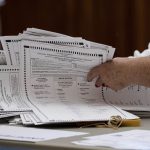ANTRIM COUNTY, MI – A local judge has ordered the results of a forensic examination, conducted on Dominion Voting Systems machines used during the general election, be released…with redactions.
Supporters of President Donald Trump may publicly release and discuss information they’ve collected from an analysis of voting machines and data in Antrim County. https://t.co/VlIODPuBtI
— The Detroit News (@detroitnews) December 14, 2020
Michigan Secretary of State Jocelyn Benson’s office agreed with the ruling that was given by Michigan Circuit Court Judge Kevin Elsenheimer.
Despite giving the okay for the findings of the forensic audit to be released, Benson’s office claimed that Matt DePerno, who is representing an Antrim County resident who filed a lawsuit claiming election fraud, is not being factual when it comes to reporting the results.
The court case was heard virtually as DePerno argued that the public had a right to know the findings of the forensic audit. Based upon this concept of transparency, he successfully argued that the findings needed to be released. DePerno said:
“We believe that the public interest in understanding what we discovered and what’s in the report outweigh any potential harm to Dominion’s software.”
#BREAKING Michigan Judge allows release of Antrim County election forensic report on Dominion Voting machines…
This order to make this forensic report public is a HUGE win for @realDonaldTrump
“it’s a national security concern…”
READ HERE: https://t.co/aWUvVSbttT
— Sara A. Carter (@SaraCarterDC) December 14, 2020
An assistant attorney general for Michigan, Erik Grill, argued that DePerno gave false information regarding the Dominion machines prior to the removal of a protective order issued by Elsenheimer previously.
Grill told the court that DePerno had also violated the terms of the protective order by giving interviews in which he discussed the case in “direct violation” of the order.
Elsenheimer, who apparently did not want to hear any of the claims of violations that may or may not have occurred while the protective order was in place, reminded all that they were not in court to discuss that. They were, however, in court to discuss reporting on the findings of the forensic report.
The judge noted that anyone was welcome to lodge a complaint on DePerno’s alleged violations at another time.
In the end, Grill concluded Benson had no issue with DePerno releasing the forensic findings on the Dominion machines, provided that her office could present counterarguments showing that his claims are “inaccurate, incomplete, and misleading.”
Grill claimed that DePerno said that Benson had lied, and further withholding the report from the public would give credence to that allegation. Grill said:
“Any effort by the secretary at this point to withhold the report would be seen as an effort to hide…there is nothing to hide.
“He [DePerno] has stated that the report proves that the secretary of state lied.
“He has stated that he’s asked the Senate majority leader to set aside the electors and appoint new electors based on what he found.”
Private forensic analysis on Dominion Voting Systems machines in one Michigan county — ordered released by a judge — found an error rate of 68 percent. Company and state officials are disputing findings. | Just The News https://t.co/XooEO38pT3
— John Solomon (@jsolomonReports) December 14, 2020
In the end, Elsenheimer ruled that the forensic report can be released to the public for their review. However, items that contained coding would be redacted in an attempt to protect the integrity of the Dominion software.
He also stated that Benson’s office must have the opportunity to review the report prior to its release.
Following the judge’s ruling, the report was released by Russell Ramsland, Jr, a former Republican congressional candidate and the co-founder of Allied Security Operations Group. Some of the members of this group were also in attendance when the forensic examination was conducted. Ramsland said:
“We conclude that the Dominion Voting System is intentionally and purposefully designed with inherent errors to create systemic fraud and influence election results. The system intentionally generates an enormously high number of ballot errors.
“The electronic ballots are then transferred for adjudication. The intentional errors lead to bulk adjudication of ballots with no oversight, no transparency, and no audit trail. This leads to voter or election fraud.
“Based on our study, we conclude that the Dominion Voting System should not be used in Michigan. We further conclude that the results of Antrim County should not have been certified.”
According to Allied Security Operations Group, the error rate found with the machine was 68.05%. This is dramatically higher than the “allowable election error rate established by the Federal Election Commission guidelines” which is set at 0.0008%.
The report continued by saying:
“Antrim County failed to properly update its system.
“A purposeful lack of providing basic computer security updates in the system software and hardware demonstrates incompetence, gross negligence, bad faith, and/or willful noncompliance in providing the fundamental system security required by federal and state law.”
State of Texas sues Pennsylvania, Georgia, Wisconsin and Michigan, at the Supreme Court over the election
December 8, 2020
AUSTIN, TX – We can all agree that 2020 has been a wild year, and of course, with a wild election that’s still going on a month after what used to be called “Election Day.”
While nothing should surprise us at this point, this headline might – the State of Texas sues Georgia, Michigan, Pennsylvania, and Wisconsin over election rules. And Texas is going straight to the top.
Texas Attorney General Ken Paxton, as legal counsel for the State of Texas, filed a lawsuit directly with the U.S. Supreme Court shortly before midnight on Monday challenging the election procedures in Georgia, Michigan, Pennsylvania, and Wisconsin on the grounds that they violate the Constitution.
There are several major factors to the lawsuit filed by Texas:
- Texas argues that these states violated the Electors Clause of the Constitution because they made changes to voting rules and procedures through the courts or through executive actions, but not through the state legislatures.
- Additionally, Texas argues that there were differences in voting rules and procedures in different counties within the states, violating the Constitution’s Equal Protection Clause.
- Finally, Texas argues that there were “voting irregularities” in these states as a result of the above.
In the text of the lawsuit filing, Texas is asking the U.S. Supreme Court to order the states to allow their legislatures to appoint their electors:
“Certain officials in the Defendant States presented the pandemic as the justification for ignoring state laws regarding absentee and mail-in voting.
The Defendant States flooded their citizenry with tens of millions of ballot applications and ballots in derogation of statutory controls as to how they are lawfully received, evaluated, and counted.
Whether well intentioned or not, these unconstitutional acts had the same uniform effect—they made the 2020 election less secure in the Defendant States.
Those changes are inconsistent with relevant state laws and were made by non-legislative entities, without any consent by the state legislatures. The acts of these officials thus directly violated the Constitution.
This case presents a question of law: Did the Defendant States violate the Electors Cla
use by taking non-legislative actions to change the election rules that would govern the appointment of presidential electors? These non-legislative changes to the Defendant States’ election laws facilitated the casting and counting of ballots in violation of state law, which, in turn, violated the Electors Clause of Article II, Section 1, Clause 2 of the U.S. Constitution.
By these unlawful acts, the Defendant States have not only tainted the integrity of their own citizens’ vote, but their actions have also debased the votes of citizens in Plaintiff State and other States that remained loyal to the Constitution.”
It makes sense that Texas approached the Supreme Court directly, since Article III provides that it is the court of first impression on subjects where it has original jurisdiction, such as disputes between two or more states.
TX v State Motion 2020-12-0… by Breitbart News
The lawsuit also states that the states enacted last-minute changes, skewing the results of the 2020 general election.
Attorney General Paxton also explained further reasoning behind the lawsuit:
“Trust in the integrity of our election processes is sacrosanct and binds our citizenry and the States in this Union together.
Georgia, Michigan, Pennsylvania, and Wisconsin destroyed that trust and compromised the security and integrity of the 2020 election.
The states violated statutes enacted by their duly elected legislatures, thereby violating the Constitution. By ignoring both state and federal law, these states have not only tainted the integrity of their own citizens’ vote, but of Texas and every other state that held lawful elections.
Their failure to abide by the rule of law casts a dark shadow of doubt over the outcome of the entire election.
We now ask that the Supreme Court step in to correct this egregious error.”
_
Want to make sure you never miss a story from Law Enforcement Today? With so much “stuff” happening in the world on social media, it’s easy for things to get lost.










